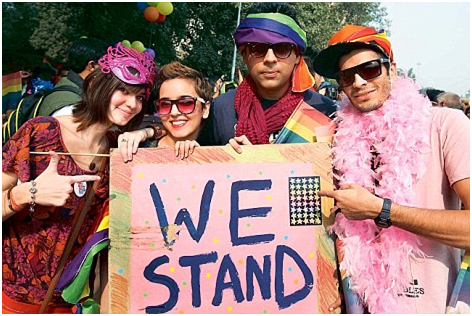Rights of Sexual Minorities ' The Changing Scenario!
Queer pride parade in Delhi
NEW DELHI: As per Census 2011, India is home to 4,87,803 transgenders of whom 1,10,000 belong to Scheduled Castes and Scheduled Tribes. Undoubtedly, sexual minorities are an oppressed class and problems like discrimination, unemployment, lack of educational facilities, homelessness, lack of medical facilities like HIV care and hygiene, depression, penectomy, problems related to marriage and adoption, inheritance of property etc have haunted them since time immemorial.
The current legal framework for sexual minorities revolves around Immoral Traffic Prevention Act of 1956 (with major amendments in 1986) & Sec. 377 of Indian Penal Code, 1860. The first attempt to uplift their status was made only in 1994 when transgenders were granted voting rights but issuance of voter identity cards got caught up in the male/female question. Since then, till recently, the state has not taken major steps for their upliftment. In fact to their miseries, on December 12, 2013 the Supreme Court in Suresh Kumar Kaushal v Naz Foundation (Kaushal) upheld constitutional validity of Sec. 377. The review petition against this was summarily dismissed. On April 3, 2014, a curative petition was agreed to be heard in an open court which is pending.
The US Supreme Court on June 26, 2015 in Obergefell v. Hodges (5:4 majority) approved same sex marriages as a right guaranteed by both the ‘due process’ clause and the ‘equal protection’ clause of the US Constitution (14th Amendment). The founders of our Constitution borrowed Fundamental Rights majorly from this US Constitution itself. Article 15(1) of our Constitution provides that there shall be no discrimination on grounds only of religion, race caste, sex or place of birth. Article 15(5) as an enabling provision, mandates that the state can make special provision by law for advancement of ‘socially and educationally backward classes of citizens’. Further Article 16(4) holds that state can make provision for reservation of appointments or posts in favour of ‘any backward class of citizen which in its opinion is not adequately represented in services’. It is therefore a legitimate constitutional expectation that social and educational sexual minorities must be uplifted by recognition through reservations.
The social fabric after the landmark judgment in National Legal Services Authority v Union of India (NALSA) has improved and slowly along with gender recognition and state cooperation, awareness as to peaceful coexistence with them has increased. There are at least four significant legal developments which require attention and applause. In May, 2014 National Commission for Backward Classes (NCBC) recommended that transgenders should be given reservation under Central List of OBCs in educational institutions and public appointments.
In April 2015, Rajya Sabha passed a private member’s Rights of Transgender Persons Bill, 2014. Recently in Shivani Bhat v State of NCT of Delhi, the Delhi High Court in a petition preferred by a transgender ordered that she must not be subjected to any harassment by state and be allowed to visit US for pursuing her course in neurobiology. Most recently, in the Factories Amendment Bill 2015, the labour ministry has reportedly introduced a new section (Sec 66A) on employing transgender persons to ensure “equality and dignity of work” for them in Indian factories.
After NALSA, Centre sent out notices to the States to implement a five step agenda and distribution of funds accordingly. Last year IIMs made provisions for giving equal rights to transgenders. Similarly, Delhi University this year added a section for sexual minorities in the postgraduate admission process.
Earlier, the University Grants Commission (UGC) sought affirmative action from higher educational institutions in favour of the transgender community. Chhattisgarh Government in September granted 2% quota to transgenders in allocations of government shops to public through urban bodies. Tamil Nadu has a provision for changing transgender people’s birth name and sex in official gazette and official identity documents either after realising their gender identity or undergoing sex transition surgeries. Though a large number of states have not yet implemented the NALSA judgment guidelines, slow progress is visible.
Meanwhile, on September 18, 2015 the Supreme Court while granting leave in State of Gujarat v Kirankumar Devnani declined in an interim order to observe homosexuality not to be akin to “social evils”. It is a democratic misfortune that even after accepting independence for over 65 years, minorities of the land are still suffering from existential crisis. The openness and awareness about having LGBTs in society and not looking them down based on anatomical differences must reach epidemic proportions including the Supreme Court itself. We look forward to the pending curative petition where civil liberties of sexual minorities may be examined & enforced. It will even better, if our noble representatives in Parliament pass a thorough and concrete legislation in this context. Things are already in motion; a legislative or judicial push may end an era of exploitation and sufferings. Hoping for the best, fingers crossed!
(The writer is an advocate practising at Supreme Court)





